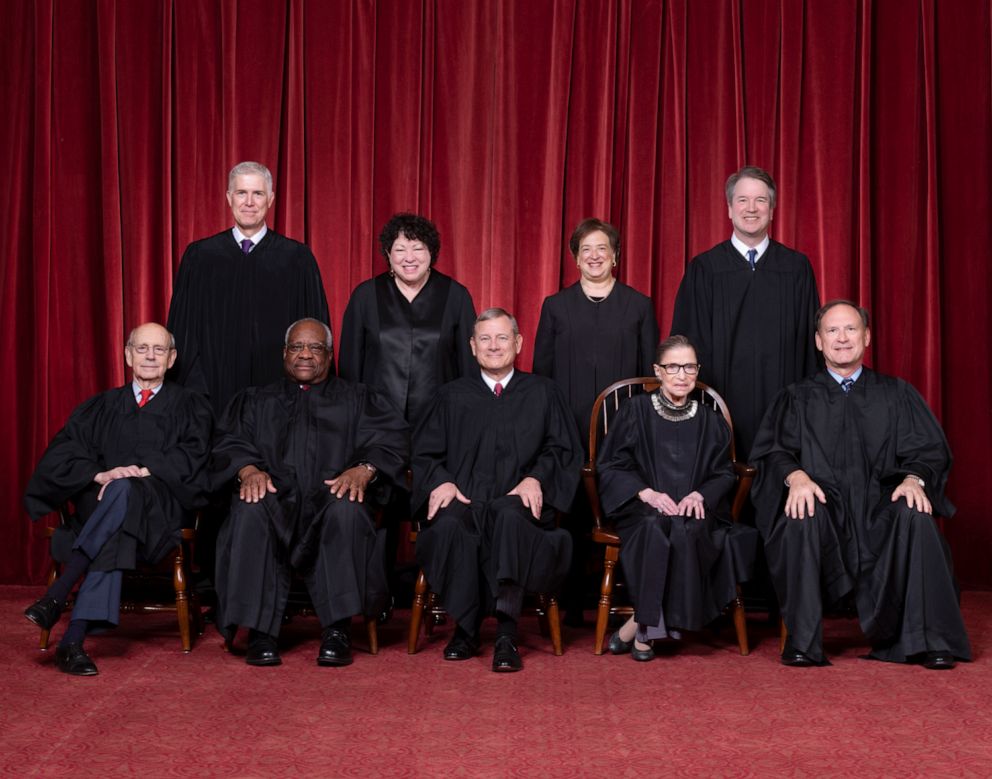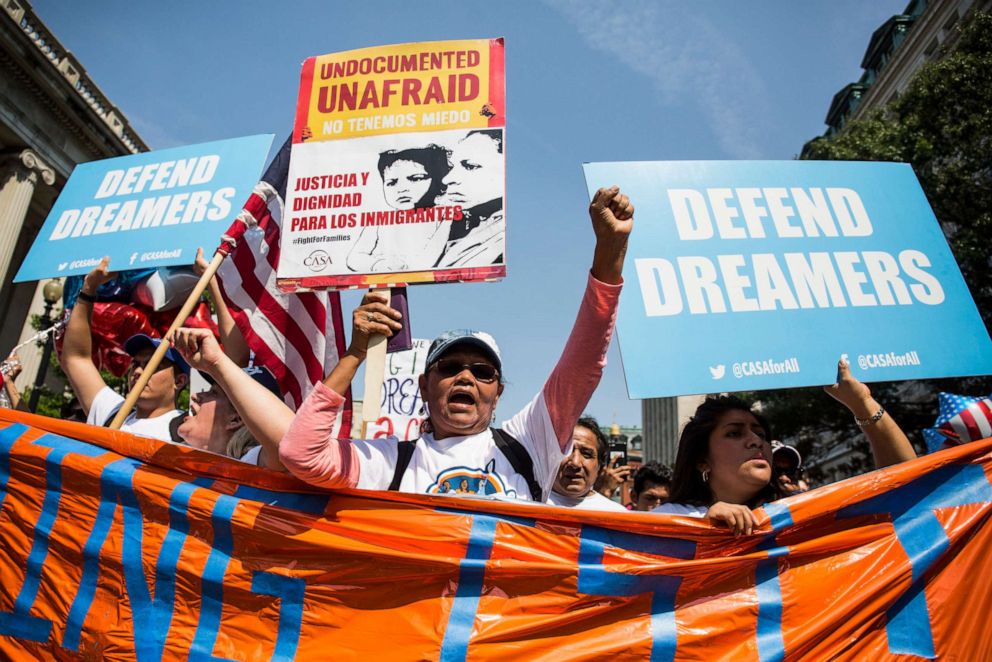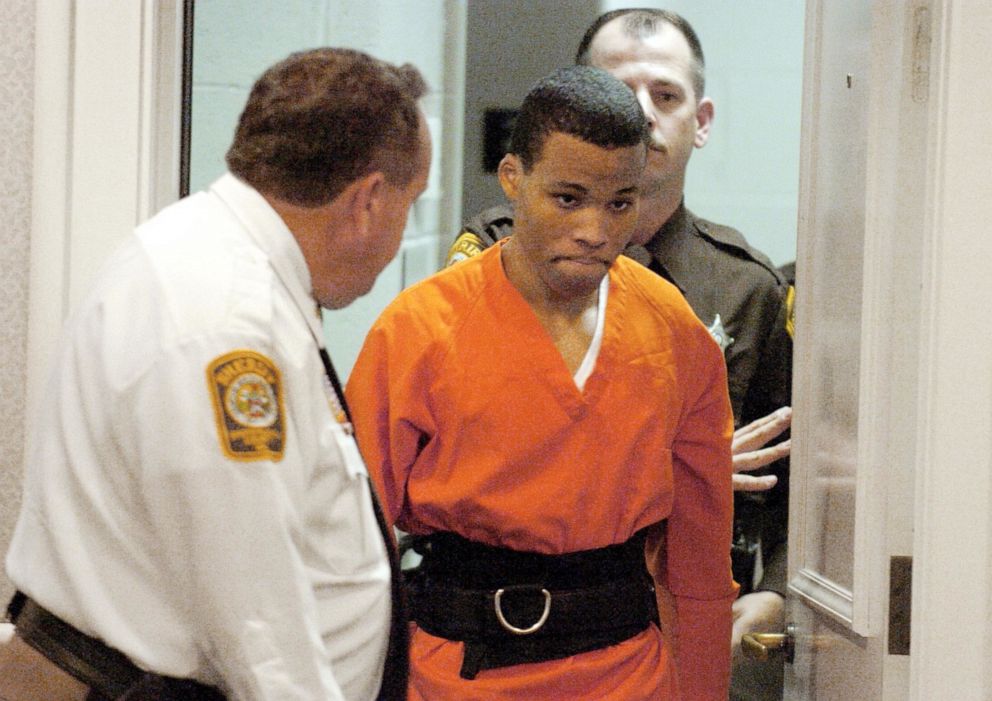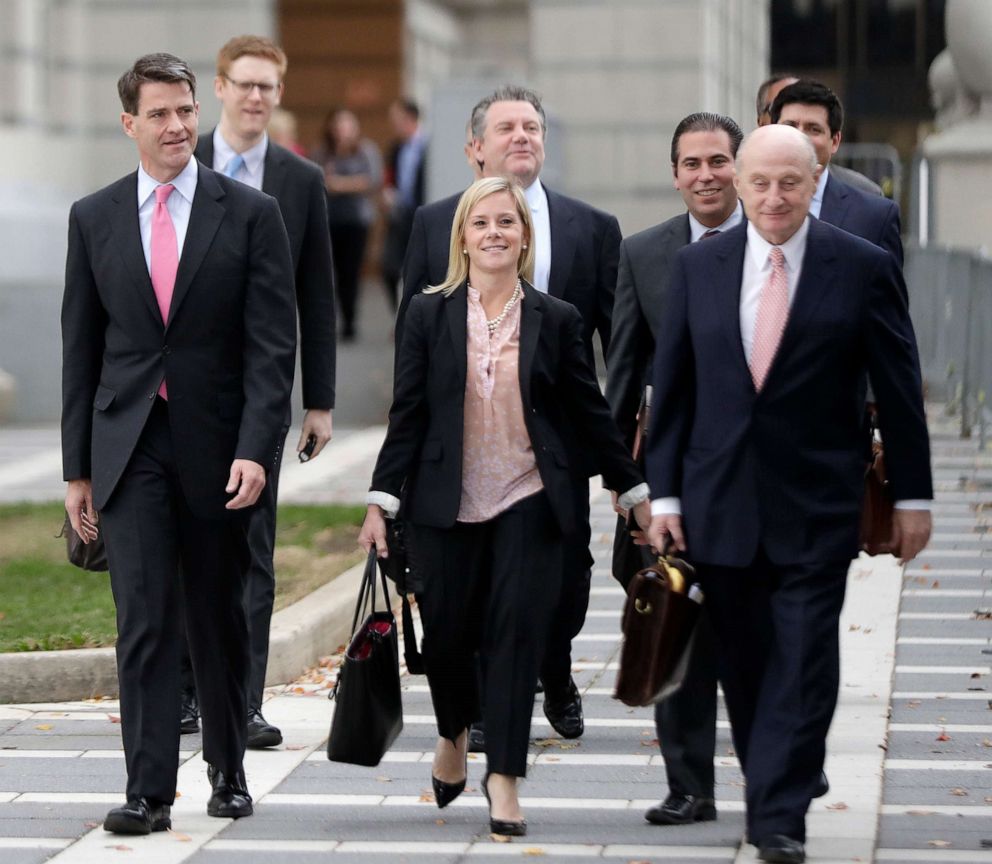Supreme Court takes on gay rights, DACA and guns in new term
The justices will hear cases on LGBT employment discrimination, DACA and guns.
Get ready for a potentially blockbuster term at the U.S. Supreme Court.
After a relatively low-profile year, the justices convene on Monday to hear cases on major hot-button issues whose decisions will come down in the heat of the 2020 campaign.
"We will likely see a court moving further and faster in a rightward direction," said Irv Gornstein, executive director of the Supreme Court Institute at Georgetown Law School. "The docket almost guarantees it."
At the top of the docket are cases on employment discrimination against gay, lesbian and transgender Americans; President Donald Trump's elimination of Deferred Action for Childhood Arrivals, or DACA, for young undocumented immigrants; life sentences for juvenile offenders; gun rights; and -- likely -- abortion.
"The court has within its hands the ability to affect the lives of 800,000 DACA recipients; tens of millions of lesbian, gay and transgender people who may or may not be protected by anti-discrimination law depending on what the court decides; and half of the country, if the court takes up an abortion case," said David Cole, national legal director for the American Civil Liberties Union. "It will be a momentous term for the rights of individuals."
The court could also wade into the legal battles over Trump's emergency declaration for a border wall; the administration's ban on asylum applications from migrants who do not cross at legal ports of entry; and whether members of the Electoral College -- who cast the actual votes for president -- may choose whomever they want regardless of their state's popular vote.
"This question has floated below the radar because we assume they will be loyal," constitutional lawyer Tom Goldstein, who founded SCOTUSblog, said of the faithless electors case. "But it actually could have enormous practical consequences."

The court has so far agreed to hear 40 cases this term. Here are a few of the most closely watched:
Fired for being gay or transgender
Altitude Express, Inc. v. Zarda
Bostock v. Clayton County, Georgia
R.G. & G.R. Harris Funeral Homes Inc. v. Equal Employment Opportunity Commission
Three of the most high-profile cases of the term revolve around the question: Can you be fired from a job for being gay or transgender?
Title VII of the Civil Rights Act of 1964 prohibits employment discrimination on the basis of sex, but there is a raging debate about whether "sex" covers sexual orientation and gender identity as protected traits.
"If the court says it's perfectly lawful to fire someone for being LGBT, that is going to have trickle-down consequences as to how lower courts interpret similar federal statutes that prohibit sex discrimination in housing, in education and in health care," said Ria Mar, an attorney with the ACLU's Lesbian Gay Bisexual Transgender & HIV Project. "The stakes could not be higher."
Advocates for the employers, backed by the Trump Administration, argue that because Title VII does not explicitly mention sexual orientation or gender identity in the text, neither characteristic is deserving of protection under existing law unless Congress amends it.
"This should be litigated in Congress rather than in front of the Supreme Court," said Elizabeth Slattery, legal fellow at the Heritage Foundation.
"It's about the meaning of 'sex' and the meaning of 'because of' -- 'because of sex,'" said Sharon McGowan, legal director at Lambda Legal. "We're hopeful the Supreme Court will look at the words on the statute and realize that 'because of sex' means what it says and that LGBT people who experience discrimination because of sex will be protected under the law."

Trump termination of DACA
Department of Homeland Security v. Regents of University of California
Trump v. NAACP
McAleenan v. Vidal
With the lives and livelihoods of 800,000 young immigrants hanging in the balance, the Supreme Court will decide whether the president's 2017 decision to end the DACA program was lawful.
DACA allows qualified undocumented immigrants without a criminal record and who are attending school to pay a fee, register with the government and receive a temporary waiver from deportation and ability to work. Federal courts put the phase-out on hold pending the outcome of the case.
President Barack Obama created the program in 2012 using executive authority; Trump argues that he has the same authority to end it. But several federal judges have ruled that Trump's decision was unlawfully "arbitrary and capricious." In a third case, a judge sided with Trump, saying Obama's decision to create the program was unlawful to begin with. The justices will resolve the conflict.
It's the case the White House considers the most important of the fall term with big implications for presidential authority.
"Trump argues that it's unreviewable by the Supreme Court because it's his discretion," said Slattery. "Even if the decision is reviewable, it's rational, not arbitrary."
University of California President Janet Napolitano, a former DHS Secretary under Obama, who brought one of the legal challenges, says the administration did not apply a legitimate rationale as required by law.
"Every lower court that has considered similar challenges to the decision to end DACA has said that the decision was done improperly," she said.
Gun transport rights
New York State Rifle & Pistol Association Inc. v. City of New York
For the first time in nearly a decade, the justices are scheduled to consider gun rights. The case involves a New York City regulation that prohibited licensed gun owners from taking an unloaded and locked-up weapon outside the city limits.
A federal appeals court upheld the policy last year. But after the Supreme Court agreed to hear gun owners' appeal, the city voluntarily reversed its rules and now allows licensed guns to be taken to a home, business or shooting range outside the city.
Gun rights supporters, however, want the justices to rule on the matter anyway, hoping the court's new conservative majority will issue a decision cracking down on state and local attempts at regulating otherwise law-abiding gun owners. Gun control advocates want the court to drop the case, arguing the issue is moot and fearing a possible unfavorable ruling.
"Even if the New York case gets dismissed that it's moot," says Goldstein, "we're about to enter the era when we learn how the Supreme Court feels about the Second Amendment" in its new configuration.

Life without parole for juveniles
Mathena v. Malvo
In 2012, the Supreme Court ruled that mandatory sentences of life without possibility of parole are unconstitutional "cruel and unusual punishment" for juvenile offenders under 18. Now, the justices will consider whether it is ever constitutional to lock away a juvenile for life.
The case involves Lee Malvo, one of the two "D.C. Snipers," convicted of murders in the 2002 capital region rampage that killed 10. He was 17 years old at the time of the crime. A Virginia state court sentenced Malvo to life without the possibility of parole -- a decision later upheld by the state's highest court. But the Fourth Circuit U.S. Court of Appeals said such a sentence is unconstitutional.
If the court rules for Malvo, he could receive an opportunity for release, along with potentially hundreds of others sentenced for life as juveniles. There are approximately 2,100 individuals serving life without parole for crimes committed as a juvenile, according to The Sentencing Project.

'Bridgegate' scandal
Kelly v. U.S.
The court will hear an appeal from Bridget Anne Kelly and Bill Baroni, two former New Jersey officials connected to then-Gov. Chris Christie, who were convicted of fraud in the 2013 George Washington Bridge lane closures scandal.
Kelly, Christie's former deputy chief of staff, and Baroni, a former official at the Port Authority of New York and New Jersey who was appointed by Christie, were accused of conspiring to close lanes at the bridge for political retaliation against the major of Fort Lee, New Jersey, who refused to endorse Christie's reelection campaign. They orchestrated the closures under the guise of a traffic study.
The justices will consider the meaning of "fraud" and whether Kelly and Baroni's public dissembling over rationale for the lane closures actually defrauded the government of property or finances.
Border Patrol agent killing of unarmed Mexican teen
Hernandez v. Mesa
In a tragic case from the U.S.-Mexico border in Texas, the justices will consider whether the family of an unarmed Mexican teenager shot and killed by a U.S. border patrol agent in 2010 may sue for damages in federal court.
The 15-year-old boy was on Mexican soil when the American agent shot him in the face from just 60 feet away, on U.S. soil. His family says the killing violated the Fourth and Fifth Amendment protections against unjustified deadly force. The government says U.S. constitutional rights don't extend for foreign nationals abroad. The Fifth Circuit U.S. Court of Appeals sided with the agent and the government.
Religious private schools and state scholarships
Espinoza v. Montana Department of Revenue
Can a state exclude religious private schools from a taxpayer-supported scholarship program?
Montana parents who want to send their children to Christian private schools want the Supreme Court to reinstate a Republican-led initiative that would give tax credits to residents who donate to a state scholarship program that would, in turn, help students attend religious schools.
The Montana Department of Revenue declined to implement the program, citing a state constitutional amendment banning the direct or indirect use of tax dollars for religious education. Several parents who had applied for the scholarships to help send their children to a Christian school sued, alleging the state violated the First Amendment by blocking religious groups from otherwise publicly available aid.
The state argues that the Supreme Court doesn't have jurisdiction over a state's constitution.
Racism and non-unanimous jury verdicts
Ramos v. Louisiana
Is a non-unanimous jury conviction constitutional? The Supreme Court in 1972 struck down the practice as a vestige of the Jim Crow era meant to discriminate against African-Americans. The court said the 6th Amendment's guarantee of a fair trial means jury verdicts in felony trials must be unanimous, but the decision only applied to federal cases.
Every state but Oregon has since amended its rules to require unanimous verdicts in state felony cases. Louisiana had been a hold out until just very recently when voters moved to end the practice last year.
Louisiana convict Evangelisto Ramos, who maintains his innocence in a gruesome murder case, wants the justices to force the state to apply their new rules retroactively and give him a new trial. Ramos was convicted by 10 of 12 jurors in his second-degree murder trial and sentenced to life without parole.
An analysis of more than 900 non-unanimous felony verdicts in Louisiana by the state's largest newspaper, The Advocate, recently found that black defendants were "significantly more likely" than white defendants to be convicted.

Suing for damages after terror attacks
Opati v. Republic of Sudan
The families of U.S. government employees killed in the 1998 embassy bombings in Kenya and Tanzania are asking the U.S. Supreme Court to clear the way for a lawsuit against the government of Sudan for its alleged support of al-Qaeda and complicity in the attacks. The Supreme Court will look at the terms of the Foreign Sovereign Immunities Act, which grants broad immunity to foreign governments in U.S. courts, and whether it applies retroactively. More than 220 people were killed in the twin bombings.
Identity theft and undocumented immigrants
Kansas v. Garcia
The federal law which forbids employers from hiring undocumented workers also explicitly bars states from using information obtained on the federal I-9 form in criminal prosecutions. Ramiro Garcia of Overland Park, Kansas, says the state broke the law when it charged him for identity theft over a fraudulent Social Security number he gave on his I-9 form when applying for a job. It was later discovered, however, that Garcia also used the fraudulent number on state forms as well. The justices will consider whether states can prosecute someone for identity theft if they are caught using fake or stolen information that appears on both a federal form and state form when applying for a job.
Can states abolish the insanity defense?
Kahler v. Kansas
A death row inmate in Kansas convicted of killing four family members in 2009 wants the justices to spare his life because, according to his attorneys, he was legally insane at the time of the crime -- and denied the chance to claim insanity in court. Kansas abolished the insanity defense in 1995, but Kahler argues that because he was severely impaired with depression at the time of the crime he cannot be put to death. The court will consider whether banning the insanity defense is constitutional.
Maui's sewage and the Clean Water Act
County of Maui v. Hawaii Wildlife Fund
Millions of gallons of treated sewage from the island of Maui are pouring into the Pacific Ocean each day, unregulated by the Clean Water Act. Several environmental groups say Maui is dumping pollutants into the sea without a permit, as required by the law. The Clean Water Act uses permits to control the amount of pollution coming from "point sources" -- e.g. pipes, drains, discharge valves -- into navigable waters, like oceans or lakes.
But the county argues that its treated sewage doesn't need a permit because it doesn't come from a point source. The waste is injected into the ground, only making its way to the ocean by groundwater, an indirect source that it can't control. Two lower courts sided with the environmental groups. The justices will decide whether the Clean Water Act applies to pollution that reaches major waterways by indirect means.
Cable TV and racial discrimination
Comcast Corp. v. National Association of African American-owned media
The nation's first and only entirely African American-owned television media company says cable giant Comcast refused to carry its channels in part because of racial animus. Entertainment Studios was founded by African-American comedian, producer and businessman Byron Allen in 1993. It owns 10, 24-hour networks, including The Weather Channel, Comedy.tv, Cars.tv and MyDestination.tv.
A federal district court dismissed the claim against Comcast; but an appeals court considered the case and ruled, "we can plausibly infer that Entertainment Studios experienced disparate treatment due to race and was thus denied the same right to contract as a white-owned company."
Comcast wants the Supreme Court to reverse, arguing there is no evidence that the company would have done a contact with Entertainment Studios but-for the race of its ownership.




